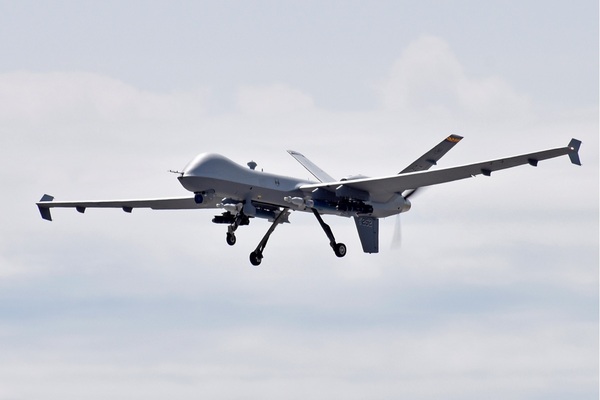Was the US drone supplying reconnaissance data for Ukraine to target Russian forces and territory?
March 16, 2023
If you take seriously Tucker Carlson’s warning about the headlong rush to outright war with Russia that would justify the crushing of political dissent at home, then it is especially important to examine what Russia has to say about its downing of a US drone over the Black Sea. Accounts throughout the US media emphasize that the drone was over international waters and that the attack was unprovoked. Yet, oddly enough, a search using multiple search engines (Google was least helpful) yielded only fragmentary references to the statement issued by Russia’s ambassador to the US, Anatoly Antonov.
The most useful account came from a tweet by someone using the handle dana 916 (hat tip: Mark Wauck). Even though I don’t know who dana is, the quote is consistent with verbiage in less complete accounts found mostly in the overseas media, and seems completely plausible as something a Russian ambassador would say under the circumstances:
U.S. drones collect data that Kiev uses to strike Russia, Russian Ambassador to Washington Anatoly Antonov said. “We are concerned about the unacceptable activities of the US military in the immediate vicinity of our borders. We are well aware of the purpose for which such unmanned reconnaissance and strike vehicles are used,” the diplomat notes in a commentary due to the fact that an American MQ-9 drone crashed in the water area Black Sea. As Antonov recalled, John Kirby, coordinator for strategic communications at the White House National Security Council, said that American devices make such flights on a daily basis. ” What are they doing thousands of kilometers from the United States? The answer is obvious: they are collecting intelligence information, which is subsequently used by the Kiev regime to strike at our armed forces and territory ,” the ambassador said. “We presume that the United States will refrain from further speculation in the media space and will stop flying near Russian borders ,” he added
U.S. drones collect data that Kiev uses to strike Russia, Russian Ambassador to Washington Anatoly Antonov said.
“We are concerned about the unacceptable activities of the US military in the immediate vicinity of our borders. We are well aware of the purpose for which such… https://t.co/CIabhKOz0j pic.twitter.com/kmGtvQoHhs
— dana (@dana916) March 15, 2023
I find the contention that the US drone was supplying targeting information believable. Why wouldn’t the US do so, especially given the fact that Elon Musk’s Starlink system has been used to enable battlefield communications for the Ukrainians to target Russian facilities?
Does this make the drone a legitimate target for Russia? I am no expert in the law of war, but the contention that the drone was supplying intelligence used for targeting weapons, if true, would make it an instrument of war against Russia.
RT, the Russian state-sponsored propaganda agency, makes some other interesting claims. Use skepticism, of course, and weigh these claims against what else you know and your common sense.
Where did this happen?
Neither the US nor Russia have provided any coordinates for the incident. The Americans argue that the drone was “operating within international airspace” over the Black Sea. The Russians claim the drone was inside the restricted airspace established for the special military operation, of which everyone was properly notified months ago. Unconfirmed reports in the Russian media put the drone’s location about 60 kilometers (37 miles) southwest of the Crimean port of Sevastopol.
Why has the US not provided this data? It would seem to bolster our case.
Note that Russia claims Crimea as its own territory, a claim the US denies.1 Nonetheless, territorial waters do not extend this far. But in war, states regularly attack in international waters (see, for example, the Battle of the North Atlantic in World War 2).
What kind of drone was it?
The MQ-9 Reaper was developed from the original MQ-1 Predator. The US military described it as an “Intelligence, Surveillance, and Reconnaissance” (ISR) platform. Though it certainly can be used for ISR work, the Reaper is primarily a “hunter-killer,” capable of carrying 1,700 kg (3,747 lbs) worth of Paveway laser-guided bombs or Hellfire missiles. Developed by California-based General Dynamics, the remotely-piloted aircraft has a wingspan of 20 meters and is powered by a 950-horsepower turboprop engine, capable of cruising speeds of 280-310 km/h. The US military operated around 300 of them as of 2021.

Photo credit: Air National Guard
Why was the drone there?
The US and NATO have ramped up their surveillance of Russia in both the Baltic and the Black Sea after the conflict in Ukraine escalated in February 2022. Washington has repeatedly confirmed providing Kiev with advice, intelligence and information needed to target the Russian military, as well as weapons, equipment and money – all while insisting the US is not a party to the hostilities. On Monday, a nuclear-capable B-52 bomber of the US Strategic Command deliberately flew towards St. Petersburg, turning around only after reaching the range required to launch a cruise missile.
If true, this is definitely a provocative act. Not that Russia does not engage in provocative acts. The “rush to war” hypothesis is strengthened by such reports.
What happened to the wreck?
The Pentagon insists that no part of the drone has been recovered by Russia, but would not provide any more details to US reporters. Moscow has not officially commented on the matter. According to open-source researchers on social media, however, the Russian navy managed to recover several parts after a search-and-rescue operation, as the US and its NATO observed from P-8A and G-550 surveillance planes.
Again, I am no expert, but it seems probable that some highly valuable technology could be acquired by Russia if it recovers key parts of the wreckage. Given that Russia is currently buying and licensing drones from Iran, which has emphasized their production using US technology acquired from wrecks, this has very broad implications beyond the Russia-Ukraine theatre.
It is always worthwhile knowing what the enemy in war is saying, especially when (lamentably) our own media is so unrelaible.
If you experience technical problems, please write to helpdesk@americanthinker.com
FOLLOW US ON



